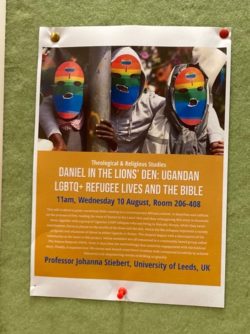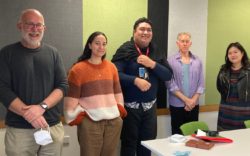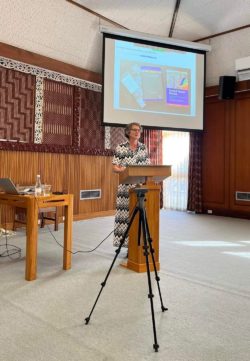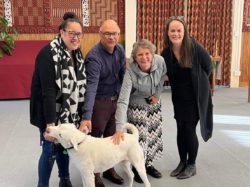Sacred Queer Stories travels to the Pacific

In August and September 2022, Professor Johanna Stiebert travelled to several locations in Aotearoa New Zealand, as well as to Brisbane (Australia). In what follows, she offers a narrative account of the trip.
Primarily, the purpose of the trip was to conduct activities centred on The Shiloh Project, a research grant that – like Sacred Queer Stories – focuses on using the Bible for gender justice. During this trip, I presented on the project, alongside other topics, in a variety of venues, and the response was very positive on every occasion.

Poster advertising the seminar
The first presentation was at the University of Auckland’s Department for Theological and Religious Studies. The structure was informal and the majority of those who attended were Masters and PhD students. This was the first in-person seminar in the Department for some time, due to the Covid pandemic, which has by now ripped through the population, following a long period of Aotearoa New Zealand being mostly sealed off from the rest of the world. Fortunately, vaccination rates are high and Aotearoa New Zealand has had low fatality rates.

Nick Thompson (left) and postgraduates, University of Auckland
Auckland’s Department of Theological and Religious Studies has cultivated teaching and research emphases on topics of gender justice at both Undergraduate and Postgraduate levels. Several of the postgraduate students attending the seminar are researching topics relevant to LGBTQ+ peoples and gender justice, and the recent Undergraduate syllabus has included modules on ‘Religious Texts of Terror’, ‘Religion, Gender and Sexuality’, and ‘Danger and Desire: The Bible and Visual Culture’. Maybe that’s why the presentation, focused on LGBTQ+ refugees in Kenya reimagining the story of Daniel in the lions’ den, was well received.

Johanna, presenting at Trinity College / St. John’s College
I also presented to an audience of members from both Trinity Methodist Theological College and St. John's Anglican Theological College in Auckland. Both institutions are committed to multi-cultural (notably, Māori, Pasifika and Pākehā) Christian education. This means that the languages and traditions of all groups with a presence on campus and in the community more widely are cherished and represented. It was striking how readily members of the audience recognised ways to adapt the ideas presented in my talk – both about Sacred Queer Stories and about MeToo and Black Lives Matter – to the context of Aotearoa New Zealand. It confirmed again what Sacred Queer Stories demonstrates: that Bible stories are dextrous and can speak prophetically to different peoples, times, and places.

Te Aroha Rountree, Paul Reynolds, Johanna, Emily Colgan and Cooper
Next, I went to the University of Otago, in Dunedin, where I presented at another relatively informal seminar. Here the audience was a mix of academics and postgraduates. This time focus of discussion was centred on the hermeneutics of trust and on how to conduct research responsibly with persons who have experienced and are experiencing trauma.
My final stop was Brisbane, in Australia. By now on my journey back to the UK, I had been invited to give the Ed Conrad Memorial Lecture at the University of Queensland. This was a real honour and delight. On this occasion, Sacred Queer Stories was right at the centre of a formal presentation. Again, our project was received with warmth and enthusiasm. If you want to find out more about the lecture and the audience’s questions, the full lecture is available here.
